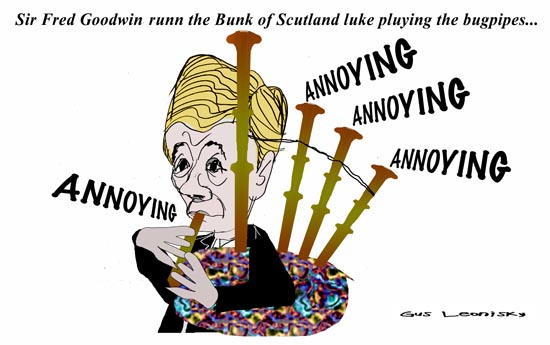Search
Recent comments
- needs the cash....
3 hours 32 min ago - fall guy...
3 hours 27 min ago - all's well....
6 hours 11 min ago - a house of straw....
8 hours 7 min ago - loaded....
8 hours 11 min ago - tsikhanouskaya....
8 hours 16 min ago - reversal.....
9 hours 34 min ago - cancelled....
13 hours 30 min ago - "concerns"......
13 hours 34 min ago - list of 20....
13 hours 38 min ago
Democracy Links
Member's Off-site Blogs
a cause for concern .....

Royal Bank of Scotland has suffered the biggest loss in British corporate history - more than £24bn - and admitted today the taxpayer could end up owning 95% of the bank if its losses continue to mount.
The troubled bank needs to sell up to £19.5bn new B shares to the taxpayer in order to insure £300bn of its most troublesome assets. As a result, the taxpayer's voting rights over the bank would increase to 75% from almost 70% now. But Stephen Hester, the new chief executive, said the government's "economic interest" could rise to 95% "depending on how things work out".On a conference call with reporters this morning, Hester said he "wanted to be honest and clear" on the government's stake because "we live in an uncertain world". But the voting influence of the taxpayer would be restricted to 75%, he said.
The scale of the losses suffered by the bank exacerbated the row about a £650,000 pension being drawn by former chief executive Sir Fred Goodwin, who is 50 and left last month after almost a decade at the helm.Treasury minister Stephen Timms said the current RBS board was "extremely concerned" by the pension deal, which threatens to undermine government claims that it would not reward failure.
guardian.co.uk- By Gus Leonisky at 27 Feb 2009 - 5:54am
- Gus Leonisky's blog
- Login or register to post comments
a grossly inappropriate reward for failure
'Fred the Shred' Puts Face on British Banking Crisis
By Kevin Sullivan
Washington Post Foreign Service
Saturday, February 28, 2009; A08
LONDON, Feb. 27 -- In the British popular imagination, the global financial crisis now has a name, and it is Fred.
As in Fred Goodwin, former chief executive of the Royal Bank of Scotland, known as Sir Fred to more decorous Britons, and "Fred the Shred" to the less charitable.
Goodwin, who until recently was a bona fide Master of the Universe, a crisp and toned bank shogun with the deeply contented look of a private-jet flier, has suddenly emerged as the chief punching bag for Britons furious about their crumbling economy.
Two disclosures on Thursday hit Goodwin like a jab and an uppercut. RBS, which Goodwin led for a decade, lost $34.2 billion last year -- a staggering national record. And the British learned that when Goodwin, 50, was forced out last fall he engineered a pension of more than $980,000 a year -- for life -- to be paid largely by British taxpayers.
This struck many as a grossly inappropriate reward for failure. "Obscene!" screamed the headline in the Daily Express.
buying a dud...
From the Guardian
City shareholders have threatened a revolt against the board of Lloyds Banking Group (LBG) over yesterday's announcement of a £260bn bailout by the government.
Chairman Sir Victor Blank and chief executive Eric Daniels, who brokered last year's controversial merger of Lloyds TSB with the ailing HBOS, are now fighting for their survival after being forced to give the government a majority stake in the bank, a move both had resisted. Any departure would pile fresh pressure on Downing Street over rewards for failed bankers, following the controversy over Sir Fred Goodwin's huge pension from RBS.
Institutional shareholders will meet the pair this week, demanding answers over the acquisition of HBOS, which generated more than 80% of the bad loans yesterday placed in a government scheme to let banks insure themselves against future losses from toxic assets.
They are also questioning the terms of the deal under which Lloyds paid a larger-than-expected £15.6bn fee in return for insuring £260bn of toxic loans, and agreed to make £28bn available in new commercial and mortgage lending over two years.
A leading shareholder said Lloyds was "largely in this position because of the decision to buy HBOS", adding: "One or both [of Blank and Daniels] is going to come under quite a lot of pressure. That was a transaction they negotiated and recommended to shareholders, and it has turned out to be disastrous."
----------------------